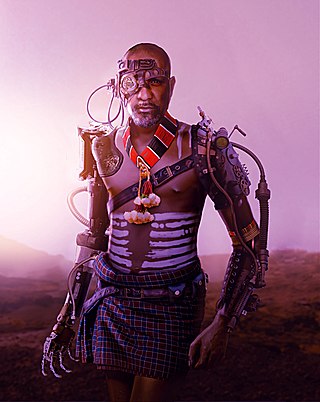Related Research Articles

The future is the time after the past and present. Its arrival is considered inevitable due to the existence of time and the laws of physics. Due to the apparent nature of reality and the unavoidability of the future, everything that currently exists and will exist can be categorized as either permanent, meaning that it will exist forever, or temporary, meaning that it will end. In the Occidental view, which uses a linear conception of time, the future is the portion of the projected timeline that is anticipated to occur. In special relativity, the future is considered absolute future, or the future light cone.

Retrofuturism is a movement in the creative arts showing the influence of depictions of the future produced in an earlier era. If futurism is sometimes called a "science" bent on anticipating what will come, retrofuturism is the remembering of that anticipation. Characterized by a blend of old-fashioned "retro styles" with futuristic technology, retrofuturism explores the themes of tension between past and future, and between the alienating and empowering effects of technology. Primarily reflected in artistic creations and modified technologies that realize the imagined artifacts of its parallel reality, retrofuturism can be seen as "an animating perspective on the world".
Futurists are people whose specialty or interest is futurology or the attempt to systematically explore predictions and possibilities about the future and how they can emerge from the present, whether that of human society in particular or of life on Earth in general.

Futures studies, futures research, futurism or futurology is the systematic, interdisciplinary and holistic study of social/technological advancement, and other environmental trends; often for the purpose of exploring how people will live and work in the future. Predictive techniques, such as forecasting, can be applied, but contemporary futures studies scholars emphasize the importance of systematically exploring alternatives. In general, it can be considered as a branch of the social sciences and an extension to the field of history. Futures studies seeks to understand what is likely to continue and what could plausibly change. Part of the discipline thus seeks a systematic and pattern-based understanding of past and present, and to explore the possibility of future events and trends.

Afrofuturism is a cultural aesthetic, philosophy of science, and history that explores the intersection of the African diaspora culture with science and technology. It addresses themes and concerns of the African diaspora through technoculture and speculative fiction, encompassing a range of media and artists with a shared interest in envisioning black futures that stem from Afro-diasporic experiences. While Afrofuturism is most commonly associated with science fiction, it can also encompass other speculative genres such as fantasy, alternate history, and magic realism. The term was coined by Mark Dery, an American Cultural critic in 1993 and explored in the late 1990s through conversations led by Alondra Nelson.

Cubo-Futurism or Kubo-Futurizm was an art movement, developed within Russian Futurism, that arose in early 20th century Russian Empire, defined by its amalgamation of the artistic elements found in Italian Futurism and French Analytical Cubism. Cubo-Futurism was the main school of painting and sculpture practiced by the Russian Futurists. In 1913, the term "Cubo-Futurism" first came to describe works from members of the poetry group "Hylaeans", as they moved away from poetic Symbolism towards Futurism and zaum, the experimental "visual and sound poetry of Kruchenykh and Khlebninkov". Later in the same year the concept and style of "Cubo-Futurism" became synonymous with the works of artists within Ukrainian and Russian post-revolutionary avant-garde circles as they interrogated non-representational art through the fragmentation and displacement of traditional forms, lines, viewpoints, colours, and textures within their pieces. The impact of Cubo-Futurism was then felt within performance art societies, with Cubo-Futurist painters and poets collaborating on theatre, cinema, and ballet pieces that aimed to break theatre conventions through the use of nonsensical zaum poetry, emphasis on improvisation, and the encouragement of audience participation.

Neo-futurism is a late-20th to early-21st-century movement in the arts, design, and architecture.

Mundane science fiction (MSF) is a niche literary movement within science fiction that developed in the early 2000s, with principles codified by the "Mundane Manifesto" in 2004, signed by author Geoff Ryman and "The Clarion West 2004 Class". The movement proposes "mundane science fiction" as its own subgenre of science fiction, typically characterized by its setting on Earth or within the Solar System; a lack of interstellar travel, intergalactic travel or human contact with extraterrestrials; and a believable use of technology and science as it exists at the time the story is written or a plausible extension of existing technology. There is debate over the boundaries of MSF and over which works can be considered canonical. Rudy Rucker has noted MSF's similarities to hard science fiction and Ritch Calvin has pointed out MSF's similarities to cyberpunk. Some commentators have identified science fiction films and television series which embody the MSF ethos of near-future realism.
Chet Pancake is an American filmmaker and musician. He is a co-founder of the Red Room Collective, the High Zero Foundation, the Charm City Kitty Club and the Transmodern Festival. He is currently an assistant professor in the Film and Media Arts Program at Temple University and director of the Black Oak House Gallery. His documentary film Black Diamonds (2006), an examination of mountaintop removal mining, has received a number of awards.

Black science fiction or black speculative fiction is an umbrella term that covers a variety of activities within the science fiction, fantasy, and horror genres where people of the African diaspora take part or are depicted. Some of its defining characteristics include a critique of the social structures leading to black oppression paired with an investment in social change. Black science fiction is "fed by technology but not led by it." This means that black science fiction often explores with human engagement with technology instead of technology as an innate good.
Indigenous Futurism is a movement consisting of art, literature, comics, games, and other forms of media which express Indigenous perspectives of the future, past, and present in the context of science fiction and related sub-genres. Such perspectives may reflect Indigenous ways of knowing, traditional stories, historical or contemporary politics, and cultural realities.

Camae Ayewa, better known by her stage name Moor Mother, is an American poet, musician, and activist from Philadelphia, Pennsylvania. She is one half of the collective Black Quantum Futurism, along with Rasheedah Phillips, and co-leads the groups Irreversible Entanglements and 700 Bliss.
Rasheedah Phillips is an American artist, author, community activist and lawyer based in Philadelphia. She is the creator of The Afrofuturist Affair and, together with Camae Ayewa, the Black Quantum Futurism multidisciplinary artist collective.

M. Asli Dukan is an American independent media producer, filmmaker and visual artist based in Philadelphia working with themes of speculative fiction and Afrofuturism.

Noah Raford is an American futurist and specialist in public policy, strategy and emerging technologies. He is a founding executive of the Dubai Future Foundation and the Museum of the Future, and is currently the Futurist-in-Chief and Chief of Global Affairs at the Dubai Future Foundation. He was responsible for several global and regional firsts, including the world's first fully functional 3D printed building and the first blockchain strategy in the MENA region.

Circuit City is a studio album by American musician and poet Camae Ayewa, released under her alias Moor Mother. It was released on September 25, 2020 through Don Giovanni Records. Composed as a recorded soundtrack for the 2019 stage production of the same name by Ayewa, the album features contributions from the free jazz collective Irreversible Entanglements and the Circuit City Band. Lyrically, the album deals with housing inequality, private ownership and institutional racism.
Africanfuturism is a cultural aesthetic and philosophy of science that centers on the fusion of African culture, history, mythology, point of view, with technology based in Africa and not limiting to the diaspora. It was coined by Nigerian American writer Nnedi Okorafor in 2019 in a blog post as a single word. Nnedi Okorafor defines Africanfuturism as a sub-category of science fiction that is "directly rooted in African culture, history, mythology and point-of-view..and...does not privilege or center the West," is centered with optimistic "visions in the future," and is written by "people of African descent" while rooted in the African continent. As such its center is African, often does extend upon the continent of Africa, and includes the Black diaspora, including fantasy that is set in the future, making a narrative "more science fiction than fantasy" and typically has mystical elements. It is different from Afrofuturism, which focuses mainly on the African diaspora, particularly the United States. Works of Africanfuturism include science fiction, fantasy, alternate history, horror and magic realism.

Before Yesterday We Could Fly: An Afrofuturist Period Room is an art exhibition at the Metropolitan Museum of Art in New York City. The exhibit, which opened on November 5, 2021, uses a period room format of installation to envision the past, present, and future home of someone who lived in Seneca Village, a largely African American settlement which was destroyed to make way for the construction of Central Park in the mid-1800s.
D. Denenge Duyst-Akpem is an afro-futurist artist, writer, and educator. She is an adjunct assistant professor at the School of the Art Institute of Chicago in the Department of Art History, Theory, and Criticism and Low-Residency MFA Program; and founder of Denenge Design. Her work bridges the disciplines of design, ritual, and ecology. Duyst-Akpem describes her work thus: "As a scholar and practitioner, I utilize the teaching of Afro-Futurism as a methodology of (Black) liberation. The foundation of this is exercising the visionary and imagination muscles in sculpting new futures that affirm the present and are rooted in the past."
References
- 1 2 Duplan, Anaïs (14 March 2017). "Moor Mother Explains Black Quantum Futurism". VICE. Retrieved 23 February 2021.
- ↑ Phillips, Rasheedah (2016). Black Quantum Futurism: Theory and Practice (Volume 1). Philadelphia, PA USA: House of Future Sciences Books / The AfroFuturist Affair.
- ↑ Owens, Cassie. "Are you thinking about time right now? For 'Black Futures' contributor Rasheedah Phillips, it's a lifelong pursuit". The Philadelphia Inquirer. Retrieved 2021-03-23.
- 1 2 "Ingrid LaFleur in Conversation with Rasheedah Phillips". Believer Magazine. 2020-10-01. Retrieved 2021-03-23.
- ↑ "An Afrofuturist Community Center Targets Gentrification". Hyperallergic. 2016-06-22. Retrieved 2017-03-13.
- ↑ "Knight Foundation gives Philly duo its new art and technology fellowship". WHYY. Retrieved 2021-03-23.
- 1 2 "With a $50,000 Grant, Black Quantum Futurism Will Continue to Disrupt Space and Time". Observer. 2021-02-18. Retrieved 2021-03-23.
- ↑ "Open Call // The AfroFuturist Affair: Time Camp 001". Berlin Art Link. 2017-05-21. Retrieved 2021-02-26.
- ↑ "Moor Mother & Rasheedah Phillips' Black Quantum Futurism awarded residency at CERN, the world's largest particle physics lab · News ⟋ RA". Resident Advisor. Retrieved 2021-03-23.